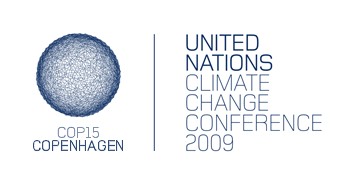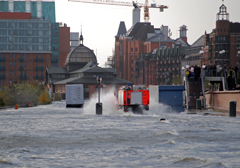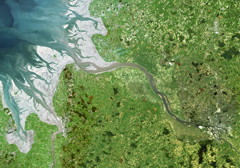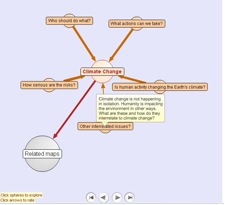Only articles in with the "climate change" tag are displayed
To display all articles click
here.
 |
2. December 2009 – 21:27 by POLITECH
|
 World’s news agencies join in interactive hub for Copenhagen climate conference!
World’s news agencies join in interactive hub for Copenhagen climate conference!
Eleven international news agencies have launched a joint Facebook page to interact with news consumers across the globe during the United Nations climate conference in Copenhagen.
The Facebook fan page, called The Climate Pool, will bring the news agencies together in an unprecedented collaboration to spark a global conversation about climate issues. The purpose of the Facebook hub (https://www.facebook.com/TheClimatePool) will be to engage readers in direct communication with the world-class journalists covering the U.N. conference Dec 7-18.
Participating are Agence France-Presse, ANP of the Netherlands, The Associated Press, APA of Austria, APcom of Italy, Canadian Press, dpa of Germany, Kyodo of Japan, Lusa of Portugal, Press Association of the United Kingdom and RIA of Russia.
The climate page on Facebook will feature a blog format, providing a behind-the-scenes view of the event and linking out to important coverage of the talks from the agencies and the media outlets they serve. Twitter also will be used to attract followers for the blog and related coverage.
The agencies have come together for the Copenhagen project under the auspices of MINDS International, a global news agency network.
“The climate summit in Copenhagen will affect the lives of billions of people, and it is likely to grip the attention of news consumers all over the world,” said Wolfgang Nedomansky, managing director of MINDS. “The Climate Pool will provide a unique outlet for Internet users to discuss climate change with some of the world’s most experienced journalists covering the conference.”
The Climate Pool page will be produced in English and will incorporate blogposts and multimedia content from the participating agencies, along with links to coverage from around the world.
The Portugese News Agency, Agencia de Noticias de Portugal (LUSA), partner of EMPOWER, an eParticipation Trial Project co-funded by the European Commission under the EU eParticipation Preparatory Action, is a leading force behind this interesting initiative.
The eMPOWER e-Petition platform will serve as an interface between decision-makers at National and European level on one hand and NGOs and citizens on the other hand, while using and testing new forms and methods of civil participation as well as enhancing the role of National News Agencies in promoting and supporting relevant initiatives and ensuring a wider outreach of the project’s results.
Posted in Events, News, Partners, Projects, good practice | No Comments »
 |
27. November 2009 – 18:13 by Zebralog / Hans Hagedorn
|
 On December 7th and 8th the COP15 will take place: Politicians, IGOs and NGOs will meet in the Danish capital and discuss how to reduce carbon emissions to decrease global warming. They aim to sign a new agreement for climate protection, a follow up of the Kyoto protocol. In forefront of the Copenhagen event, online debates try to influence the discussions’ outcome.
On December 7th and 8th the COP15 will take place: Politicians, IGOs and NGOs will meet in the Danish capital and discuss how to reduce carbon emissions to decrease global warming. They aim to sign a new agreement for climate protection, a follow up of the Kyoto protocol. In forefront of the Copenhagen event, online debates try to influence the discussions’ outcome.
The Kyoto protocol will expire in 2012. Until then, a new global agreement on climate change is needed. But the outcome of COP15 - the Copenhagen Climate Conference of the Parties to the UN Framework Conventions on Climate Change - is still unclear; experts suppose that COP15 will end with a political agreement signed by world leaders instead of with a binding treaty. Especially that the US Senate delayed a decision about a climate change legislation bill lowered the expectations for the Copenhagen meeting.
Read the rest of this entry »
Posted in Events, Trends | 3 Comments »
 |
15. October 2009 – 11:38 by Bengt Feil
|
Climate change is one of the biggest scientific, political and social problems of the 21st century. All nations of the world are challenge by the threads and to a lesser degree opportunities climate change brings with it. Consequently this topic is discussed among world leader in forums like the United Nations Climate Conference later this year. But all these efforts to mitigate the change of climate, even if there was agreement among countries on the necessity to mitigate it, will not stop the impacts of the change immediately. Therefore there is a need to look for ways to adapt to climate change and to protect humans and the environment from its negative effects.
The German ministr y for education and research has set up a series of large scale projects to research the possibilities of different urban and rural areas to adapt to climate change in the next 50-100 years. The Klimzug-Nord project will undertake this effort for the metropolitan region of Hamburg, which is influenced both by the nearby North Sea and the river Elbe. The project duration is 5 years, has an overall volume of 25 million Euro and it incorporates dozens of Universities, research centres, governmental bodies and companies. This region has 4.3 million inhabitants which will be affected by the changing climate. As the adaptation to climate change does mean major decisions in urban development and other political areas there is a need to get the cities involved in this process. This is where eParticipation meets climate adaptation.
y for education and research has set up a series of large scale projects to research the possibilities of different urban and rural areas to adapt to climate change in the next 50-100 years. The Klimzug-Nord project will undertake this effort for the metropolitan region of Hamburg, which is influenced both by the nearby North Sea and the river Elbe. The project duration is 5 years, has an overall volume of 25 million Euro and it incorporates dozens of Universities, research centres, governmental bodies and companies. This region has 4.3 million inhabitants which will be affected by the changing climate. As the adaptation to climate change does mean major decisions in urban development and other political areas there is a need to get the cities involved in this process. This is where eParticipation meets climate adaptation.
The Klimzug project does include a governance strategy which makes use of eParticipation and other participatory approaches. The use of eParticipation in this context has two major goals: Firstly to get citizens actively involved in the development of adaptation strategies and secondly to test how participatory tools and processes have to be designed in a context that covers a highly complex topic which stretches an extremely long time period. The DEMOS eParticipation approach developed by TuTech will be used in Klimzug-Nord to discuss possible projects, activities and policies to adapt to climate change as well as to gather the ideas and views of the people living in the region on how to best adapt and which priorities to be set. The different issues to be addressed by eParticipation in this project range from “how to organize water irrigation in agriculture” to “how to prevent major floods in the densely populated city area of Hamburg”.
approaches. The use of eParticipation in this context has two major goals: Firstly to get citizens actively involved in the development of adaptation strategies and secondly to test how participatory tools and processes have to be designed in a context that covers a highly complex topic which stretches an extremely long time period. The DEMOS eParticipation approach developed by TuTech will be used in Klimzug-Nord to discuss possible projects, activities and policies to adapt to climate change as well as to gather the ideas and views of the people living in the region on how to best adapt and which priorities to be set. The different issues to be addressed by eParticipation in this project range from “how to organize water irrigation in agriculture” to “how to prevent major floods in the densely populated city area of Hamburg”.
It will be interesting to see how eParticipation can help to open up a research project to the general public especially with such a complex topic at hand. We will report back on the problems and successes we encounter as we go along in this interesting and challenging project.
Posted in good practice | No Comments »
 |
29. September 2009 – 15:46 by Olga Lacigova - 21c
|

Just 100 days before the Copenhagen Climate Change Conference, Fondation Sophia Antipolis, a partner of the WAVE project, will be hosting a breakfast meeting entitled:
Reduction of Greenhouse Gases: How to Intensify the Efforts?
The meeting will take place on Friday 16th October 2009 at 9am at the Picasso room - Place Sophie Laffitte - Fondation Sophia Antipolis
The breakfast aims to:
- Discuss the emergency of the climate change topic with involved actors such as politicians, NGO, scientists, civil servants etc.
- Launch the French WAVE website (www.debatclimat.eu) and introduce the innovative argument visualisation tool – the DebateGraph – to the community
- Reinforce the participation of citizens in the legislative and decisional process within the parliaments and governments
The WAVE project co-funded by the European Commission – aims to improve the inclusiveness and transparency of EU decision making at the national and European level by using highly integrated, state-of-the-art Argument Visualisation techniques to make the impact of complex EU environmental legislation on climate change more accessible and easy to understand for citizens, special interest groups and decision makers alike.
For more information and to register, please contact Farouk Raïs at: rais@sophia-antipolis.org / www.sophia-antipolis.org /+33 (0) 4 92 96 78 05
Posted in Events, Projects, Tools | No Comments »
 |
15. June 2009 – 00:46 by POLITECH
|

Forums, blogs, and wikis are extensively used in current eParticipation
sites to gather user opinions on particular issues. However, such forms
of participation generally provide no structure to the information
gathered, so opportunity for analysis of the opinions is limited.
The WAVE project (Welcoming Argument Visualisation to Europe) https://www.wave-project.eu/ is part of the eParticipation Action , co-financed by the European Commission, under the MOMENTUM’s eParticipation umbrella.
It’s platform aims is to facilitate the debate and discussion on certain topics by interested stakeholders in order to have specific impact on one of the most important and popular legislative agendas facing Europe : Environment.
Wave is encouraging eParticipation about Climate Change, for having a clearer vision of the European Union preoccupations and laws.
While Environment and Climate Change is becoming the new challenge of XXIst Century as reflected in the results of the last European Elections (2009), WAVE aims to improve the inclusiveness and transparency of EU decision making at the national and European level by using highly integrated, state-of-the-art Argument Visualisation techniques to make the impact of complex EU environmental legislation on climate change more accessible and easy to understand for citizens, special interest groups and decision makers alike.
WAVE will be deployed on 3 pilot sites: The French Senate (France), The Lithuanian Parliament (Lithuania) and UK Parliament (United Kingdom).
The technology behind WAVE will be based on the award wining DEBATEGRAPH platform, an innovative argument visualisation platform, in a multi-lingual, cross border context. A global graph of all the debates that enables us to visualise and deepen our understanding of the ways in which different debates are semantically interrelated, and ways in which these interrelated debates shape, and are shaped by, each other. https://www.debategraph.org

To have an impact, the data must be condensed into an easily processed format, so that the arguments may be consumed and deliberated by citizens and policy-makers.
“DebateGraph is a fascinating demonstration of how interactive graphics can explain, and invite participation, in the sort of issue debates that usually are carried out via articles, essays and speeches. It reveals, in ways I haven’t seen before, how ideas relate to each other in a variety of dimensions. What’s cool here: This tool lets you “see” and engage with ideas, and explore their inter-relationships, very elegantly. Ink-and-paper, or even a dead online graphic, does not invites, or even permit, this kind of thinking. The Debate Graph also invites users to add content and extend the argument.”
Craig Stoltz, Time.com Top 25 blogger and ex-editor at The Washington Post.
WAVE will feed back its results to MEPs and MPs that have affiliated with the project in order to ultimately join up with and inform at least three governments – the national governments of the three trial sites – UK, France and Lithuania. Uniquely, Debategraph will not only enable citizens and decision makers with differing points of view to more easily comprehend complex environmental debates; it will also empower them. Moreover, rather than merely visualising the results of individual debates, the WAVE project will depict the relationships between competing argument strands – a factor which is crucial to developing a full understanding of complex, inter-related issues, but which has only now become possible through the use of latest generation web technology.
WAVE will measure if these tools can have an impact on one of the most important and popular European Challenge: Climate Change
For more information:
Project Website: https://www.wave-project.eu
Join WAVE on Facebook: https://www.facebook.com/group.php?gid=105776916968
Join WAVE on Twitter: https://twitter.com/WAVE_project
Join us on Linked-In: https://www.linkedin.com/groups?gid=1971293
Claire Mercier
POLITECH INSTITUTE
Posted in News, Projects, Trends, Uncategorized | No Comments »
 |
28. October 2008 – 19:06 by Francesco Molinari
|
Climate is changing, let’s change our views… On November 15th 2008, a pan-European Town Meeting on climate change will be held in three regions of Europe (Tuscany, Catalonia and Poitou-Charentes). Several discussion tables will be set up in the venues of Florence, Barcelona or Poitiers, particularly open to young people: the final goal is to provide the European Parliament with a structured list of priorities for future legislation and regulation in this delicate policy area. The Town Meeting is organised in the context of the European project IDEAL-EU - for further information please visit: www.ideal-eu.net. Even if you are not living in those regions, you may still have the chance to take part in this event as a Virtual Participant. It’s a new way to participate to the discussion, which is being experimented for the first time in Europe and possibly all over the world. Remote discussion tables will be arranged to give people the opportunity of joining the discussions without moving from home. Virtual participants will interact with other European citizens and youngsters on line. They will be able to vote on the different proposals emerging from the discussion tables, and give their contributions to the final results of the day. If you speak English and are a regular chat user, please contact urgently Francesco Molinari or Chiara Cordone to join in! Their email addresses are: mail AT francescomolinari.it and chiaracordone AT avventuraurbana.it. Please feel free to distribute this communication among your friends or collegues.
Posted in Interview, Partners, Uncategorized | No Comments »
 |
31. May 2008 – 15:03 by Rolf Luehrs
|
Web-Conference on climate change aims to involve 1 million participants
Climate change is currently one of the most discussed topics in politics, which is no surprise since its consequences are threatening modern society as such. It is likely that Internet will play a major role to inform people about the latest scientific findings and the developments to be expected in the near future. Because of the interactive nature of the web it is at the same time considered to be the lead channel to launch “save-the-world” like campaigns or to develop coping strategies involving thousands or even millions of people. In other words the climate change may become an important issue for eParticipation projects.

We are already aware of some of these projects and will try to continuously report about this theme. (If you know additional projects in that domain, please let us know!). The first one I would like to introduce is the web conference “Climate 2008” (www.klima2008.net) which will take place between November 3rd and 7th this year. The project is organised by the research centre Applications of Life Sciences of the University for Applied Science in the city of Hamburg (Germany) and supported by the United Nations Environment Programme. Read the rest of this entry »
Posted in Projects, TuTech | No Comments »
 World’s news agencies join in interactive hub for Copenhagen climate conference!
World’s news agencies join in interactive hub for Copenhagen climate conference!
 On December 7th and 8th the
On December 7th and 8th the 
 approaches. The use of eParticipation in this context has two major goals: Firstly to get citizens actively involved in the development of adaptation strategies and secondly to test how participatory tools and processes have to be designed in a context that covers a highly complex topic which stretches an extremely long time period. The
approaches. The use of eParticipation in this context has two major goals: Firstly to get citizens actively involved in the development of adaptation strategies and secondly to test how participatory tools and processes have to be designed in a context that covers a highly complex topic which stretches an extremely long time period. The 







